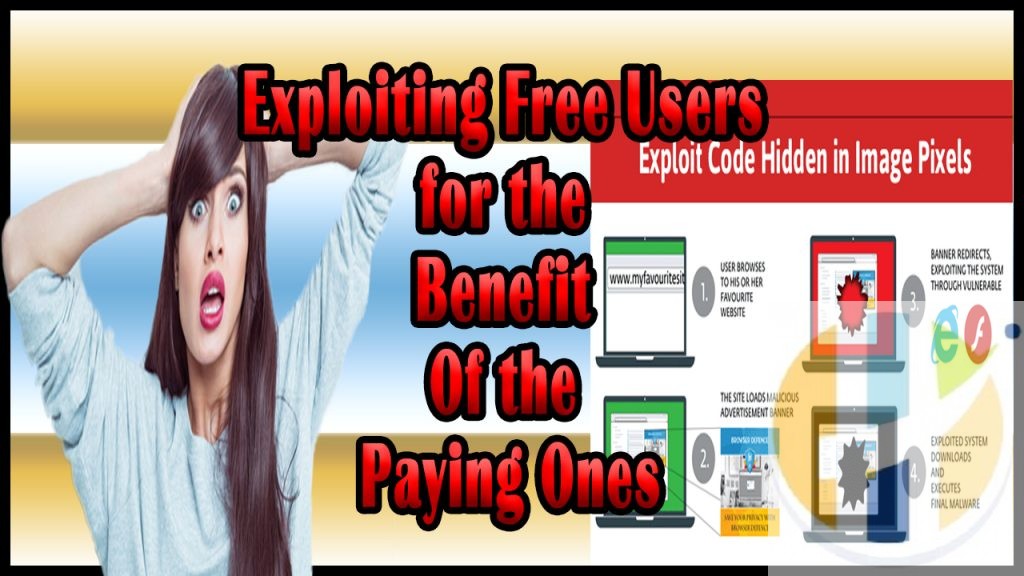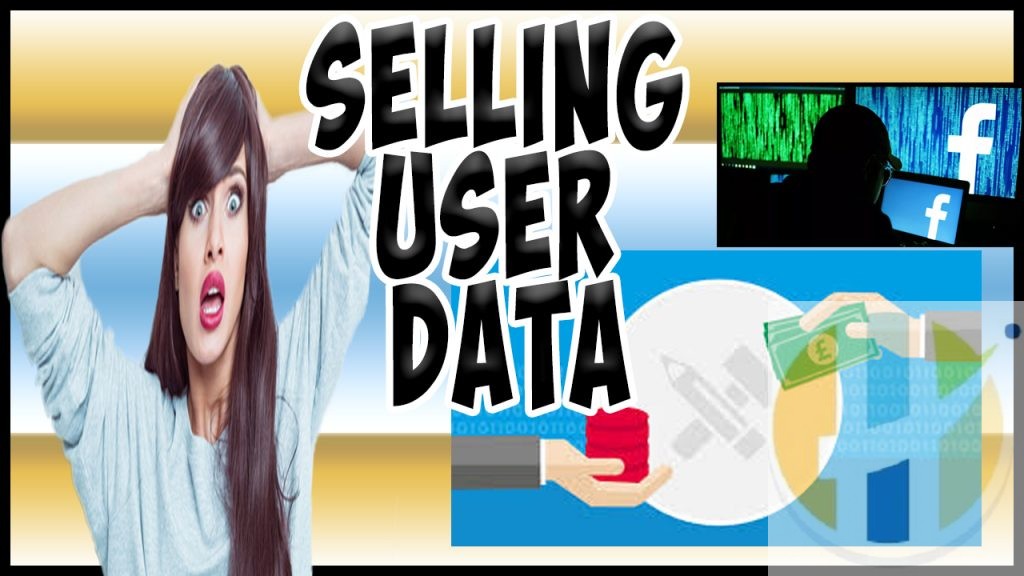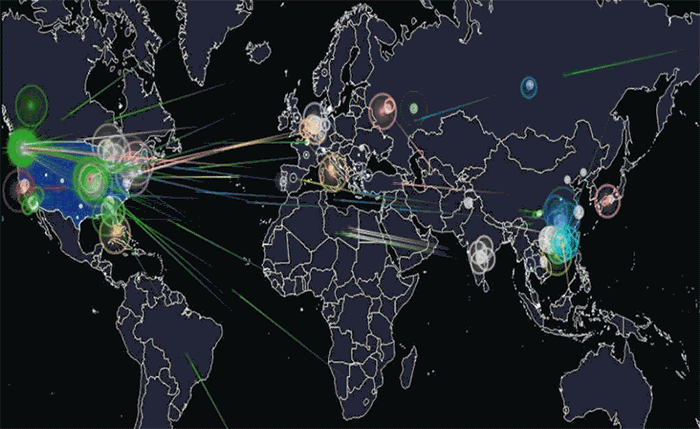
How Free VPNs Make Money? 5 Scary Facts to Know
VPNs have become an extremely useful tool for many online privacy enthusiasts. Many internet goers like using free VPN service because they are simple, easy to use and most importantly, come without a price tag. But, what many VPN users tend to forget is that running a VPN service costs money. While paid VPNs finance themselves through subscriptions, free VPNs have to earn money through different methods. So, how do free VPNs make money? Here are 5 scary facts you should know about free VPNs.
How Free VPNs Make Money
1. Selling Users Data
We’ll start off the list with probably the scariest thing VPNs do in order to make money off of their users, and that is selling the information and data their customers provide them with. This is without a doubt one of the most dangerous things a free VPN can do, as it directly affects their customer’s privacy and puts users to possible security breaches.
So, how and where can a free VPN service sell your data? Well, going by the records of some VPNs that were actually caught doing this, there’s a number of ways VPNs go about. To put this in simple terms, they mine the data out of the user’s device and create separate files for each person. This amount of data and personal information they can potentially mine out of a device is really unsettling.
Starting from your devices information and location data, all the way to personal information, e-mails, messages, phone numbers and basically everything stored in your device’s memory. Some VPNs have even managed to gain full control of their user’s devices, which allowed them full and unrestricted access, including possibilities of editing, modifying and even deleting media from the controlled device.
In some cases, VPNs sell their users emails to third-party businesses. This is a huge problem for you as the user, as you’ll not only get a ton of spam and unwanted emails, you also can never know how many people and companies have your email address. Ransomware, crypto jacking, and phishing emails are just some of the potential consequences of the VPN mishandling your email.
This sounds too scary to be true, so the biggest question that comes up from all of this is – shouldn’t it be illegal? Well, unfortunately, most free VPN users don’t go over the Privacy Policy before signing up to a new service. It means that as long as a VPN states it can share your information in any shape or form and you agree to it, it’s not illegal. It’s definitely not ethical and moral, but sadly it’s a loophole that many free VPNs know how to take advantage of.
2. Marketing Based on Personal Information

In line with the first thing we talked about, openly sharing data for marketing purposes is another very dangerous practice some free VPNs allow themselves. The reasoning behind this is, of course, very understandable. Since they’re not making any money off of user subscriptions, they compensate theirs loses by making money in different ways. There are a couple of different ways a VPN can share their customer’s data for marketing purposes.
The first one is that they directly use your data and information for marketing and advertising purposes. It means that every time you log in or look up something online that interests you, the VPN stores this information and uses it to determine which ads to sell to you and how to do it the most efficiently. The second way they go about it is that they openly share this data with third-party companies and their partners. This is the more dangerous option of the two, as the VPN and the marketing company are basically integrated into one platform and both have complete control over your data. It’s so dangerous because the marketing company often links ads from websites and pages that are not reliable sources. These ads are not just frustrating, but can also lead you to malicious sites.
There are many examples of this, but probably none better than Betternet, which is a free VPN service that publicly and openly states their affiliation with online marketing companies. They don’t hide the fact that they run an ad-oriented business model. However, they don’t go into much detail to reveal their location, business information and important details on how this ad-oriented business model operates behind the scenes.
The only upside of this problem is that it is a really good way to judge how trustworthy a free VPN is. To put it in different words, if you notice your VPN is aggressively bombarding you with ads, it’s a telltale sign that they’re very likely sharing your personal information and activities with third party websites.
3. Exploiting Free Users for the Benefit Of the Paying Ones

Besides selling your personal information to third parties, free VPNs can exploit your trust in a number of different ways, the most prominent one being for the benefit of their paying customers. This is a problem that arises when a VPN simultaneously operates as a free service and a paid one. It’s because the VPN then operates separately on two completely different levels. They give you, the free user, access to the internet without any conditions, but also at the same time, they exploit your connection in a variety of ways.
The best examples of this underhanded technique are the VPNs that use the free user’s processing power and transfer it to their paying customers. This essentially means that the VPN is selling your bandwidth to other users for profit. Of course, you can avoid it by opting for a paid membership if the VPN offers one. The only catch is that there are VPNs that don’t share this information with their free users, so you can’t know if your device and connection are being used to further someone else benefits.
4. Creating BotNets and Exit Nodes
If the previous tactics that VPNs use wasn’t scary enough, this one comes with some real-world consequences that can get you in a lot of trouble with the law. While some VPN users might not have a problem with this type of service exchange, it can actually bring them a significant headache down the road. Being a server exit node means that all of the traffic that goes to the end node server is depicted like it's coming from that server’s IP address.
This could get you in a heap of trouble, as the traffic that’s going through could include all kinds of illegal activities, searches and browsing history. Its definitely not worth the risk, especially when you consider that you’re taking up all of the responsibility without getting any compensation, while the VPN service makes money from all of their paying members that use your connection and IP address as an exit node.
There have been recorded cases where innocent people were under government investigation for performing illegal activities over the internet. All of this happened because the VPN they thought they were using for free was actually using their network and IP address to create a botnet which allowed other users to connect to their IP address. Moreover, hackers managed to take control of all of the free accounts in the VPN’s network and create a large botnet they could use for anonymous malware attacks. Although all of this sounds like a plot from a thriller movie, this was a real-life case that happened to Hola VPN users.
Even though the scandal surrounding Hola VPN was a big landmark that helped shed light on the danger of using free VPNs, there are still free VPNs that are doing this. The terrifying part of all of this is that there are currently no procedures or measures set in place to monitor how these VPNs exploit the trust of their users.
5. Tracking User Activity
![]()
Last, but definitely not least, the most common offence that free VPNs make and one that many of their users (un)willingly agree to is tracking online activity of their members. There’s a lot of VPNs that keep connection logs. This is primarily to keep their service running without any hiccups and ensure that the networks are secure and encrypted. However, connection logs can also be used to track the habits and interests of a particular user.
They do this in several ways. Most often it is by inserting browser cookies. These tools can track all of your online activities without you even being aware of it most of the time. The other two ways of tracking your online activities are web beacons and tracking pixels. Web beacons are also called web bugs are more common than you think. They are those recognisable clear picture files used to track your activity on the internet. Tracking pixels work similarly to web beacons but are different in appearance. They are more useful for analysing data and tracking users online behaviour. Not only does the VPN use these tools to track your activity, but in some cases they also allow their marketing partners to do.
So, while you think you’re anonymous and private while using the VPN services, your online activities are actually being tracked at all times. While most VPNs won’t admit to this, they do collect your information and all of your activity data and keep it, most often, for the highest bidder. Unlike free VPNs, the ones you have to pay for usually list everything in their Privacy Policy, which means that when you’re paying for a service, you can actually check if you’re getting what you’re promised.
Using a VPN that tracks your online activity defeats the purpose of using the VPN at all. Instead of your Internet Service Provider being able to track your activity, you are giving this power to the free VPN, which is a very dangerous thing to do, as you can never tell if their intentions are good or bad. If a free VPN is located in one of the 14-eyes countries, it also means that they are obligated to share any of the information the government of the country they’re located in asks them for. This is a risky position to put yourself in as again, you are the only one taking up the responsibility if something goes badly.
Why do Free VPNs Use Such Tactics?

For some VPNs out there, making money comes before their user’s safety and privacy. Selling user data, using it for advertising or blatantly breaching their security and privacy are just some of the ways free VPNs make money. But, before we get into the details, it’s important to talk about all of the important aspects and understand why some free VPNs abuse their customer’s trust. Here are the biggest reasons why they do this:
High Maintenance Costs
As we said in the beginning, it’s easy to forget that running a VPN network costs money. Depending on the size of the VPNs customer base, monthly costs of upkeep can easily climb up to tens of thousands of dollars. Not to mention, as the VPN grows and needs more stable and powerful servers, these costs can climb up to hundreds of thousands or even millions. That’s why server costs are probably the biggest reason why most free VPNs decide to go behind their customer’s backs.
Financial Gain
Of course, breaking even doesn’t sound as nearly as good as making money. That’s why some VPNs decide to go a step further and use their customer’s data in certain ways that allow them to make more money. This most often includes selling or sharing data with third parties or creating heavily targeted ads that bring in more profit from advertisers.
Greed
Although some people may argue that the first reason is justifiable, and even the second one, no one could possibly excuse acts that come from pure greed. When you have confidential data of tens, even hundreds of millions of users, it becomes very tempting to put all of this knowledge and power into use. Many popular free VPNs have succumbed to this, with Hola, Betternet and even Opera VPN getting shut down for a time for trying to monetize their user’s data.
Why You Should Choose a Paid VPN Service
Free VPN services can’t be compared to ones that come with a price tag. They offer a certain level of safety and privacy guarantee that simply cannot be matched by a free VPN. With bigger budgets and well-defined business models, paid VPNs simply offer a service which free VPNs cannot match. Benefits of using a paid VPN include:
- Better Connection Speeds – Free VPNs often restrict internet speeds of their free users in favour of their paying customers. With a paid VPN service, you can enjoy improved internet speeds and even enjoy bandwidth throttling from your ISP. Connection drops are much rarer, and you won’t suffer from any issues free that VPNs with lesser quality suffer from.
- Clear Privacy Policy – As we’ve previously mentioned, free VPNs are often secretive and not very honest when it comes to sharing their business model with their free customers. When you’re paying for a VPN, you know what you’re getting and exactly how private you are when connected to a VPN server.
- The diversity of Servers – The number of servers comes hand in hand with internet speed. The more servers a VPN has, the less crowded they’ll be, which means faster connections. In addition, if you’re using a VPN to access geo-restricted or blocked content from another part of the globe, you can simply connect to a server closest to your desired location and enjoy unrestricted access, no matter where you are.
- Security – Paid VPNs can come with a number of extra features attached to them. This includes different encryption protocols, special features such as the kill switch, better and stronger encryption. When you’re paying for a VPN service, you should settle for no less than the industry standard 256-bit encryption.
- Customer Support – Same as all of the above-listed benefits, good support comes at a certain cost. This doesn’t mean you have to overpay for your VPN service. It just means that if it happens that you face a problem using a VPN, you can expect someone to be stand-by and assist you when you need help.
Top 3 Premium VPNs
With all of this being said, keep in mind that not all paid VPNs are good or come without any flaws. It’s always best to do a bit of research before opting for a VPN. To help you choose the most suitable VPN for your needs, we’re bringing you the top 3 premium VPNs currently available.
#1. IPVanish
 Coming in at second place, IPVanish is perfect for people who frequently download files and content from the internet. It offers good and stable download speeds, with unlimited bandwidth and unlimited P2P traffic. With servers in more than 60 countries, absolutely zero traffic logs and up to 10 simultaneous connections, IPVanish is a really convenient VPN. Though its interface might not be as easy to use like ExpressVPN’s, it offers a lot of customizability, which will surely impress more experienced VPN users looking for a new VPN.
Coming in at second place, IPVanish is perfect for people who frequently download files and content from the internet. It offers good and stable download speeds, with unlimited bandwidth and unlimited P2P traffic. With servers in more than 60 countries, absolutely zero traffic logs and up to 10 simultaneous connections, IPVanish is a really convenient VPN. Though its interface might not be as easy to use like ExpressVPN’s, it offers a lot of customizability, which will surely impress more experienced VPN users looking for a new VPN.
- Good Speeds
- No logs
- AES-256 encryption
- P2P allowed
- 7-day money-back guarantee
Read my IPVanish review
Check IPVanish pricing
#2. ExpressVPN

ExpressVPN is widely regarded as the best all-around VPN. It does come at a bit steeper price compared to the competition, but the service you get in return is more than worth the cost. ExpressVPN is probably the most convenient VPN currently available, as it’s easy to set up and is available on any device. They have a pretty impressive server network that includes over 3000 high-speed servers in 94 countries and 160 locations. Speaking of high speed, ExpressVPN speeds are among the best around as you are guaranteed maximum efficiency when connected to one of their servers. You can expect speeds to range between 80Mbps and 85Mbps on a 100Mbps network.
- Fastest Speeds among all other VPN providers
- No logs
- OpenVPN, IPSec & IKEv2
- Torrents / P2P Allowed
- Unblocks Netflix, Hulu, BBC iPlayer
- 24×7 Live chat support
- 30-day money-back guarantee
Read my ExpressVPN review
Check ExpressVPN pricing
#3. CyberGhost
 If you’re going for the best combination of quality and quantity, Cyberghost is the way to go. With the lowest membership price and a 30-day risk-free guarantee, Cyberghost is a risk-free option for every privacy enthusiast on a budget. Besides being very affordable, Cyberghost packs a strong punch. With over 5200 servers in 62 countries all around the world, they offer the largest server network out of all VPNs. Their military grade double encryption and no logs policy make them an ideal option for browsing, streaming and downloading content.
If you’re going for the best combination of quality and quantity, Cyberghost is the way to go. With the lowest membership price and a 30-day risk-free guarantee, Cyberghost is a risk-free option for every privacy enthusiast on a budget. Besides being very affordable, Cyberghost packs a strong punch. With over 5200 servers in 62 countries all around the world, they offer the largest server network out of all VPNs. Their military grade double encryption and no logs policy make them an ideal option for browsing, streaming and downloading content.
- Good Speeds
- No logs
- OpenVPN, IPSec & IKEv2
- P2P allowed
- Unblocks Netflix
- 30-day money-back guarantee
Check Cyberghost pricing
Conclusion
Although the internet can be a scary place sometimes, with a few extra steps you can enjoy unrestricted and safe access, and it all starts with getting a reliable VPN. If you truly value your online privacy and security, don’t settle for a free VPN service. There are plenty of choices available out there, starting with just a couple of bucks per month. We’ll end it with a sentence you should always keep in mind, not only when using the internet. Everything comes with a certain cost, and if you’re not paying the price of the service, it most often means that you are the product.
[ad_2]







This is so true!!! I was using a free provider and guess what happened? Spam, spam, spam, and some lost accounts. After this unpleasant incident, I use only a trustworthy and toll NordVPN. I used CyberGhost but then have switched to NordVPN, as I have read some reviews on speed and they came out to be faster, however, they are a little bit pricier.